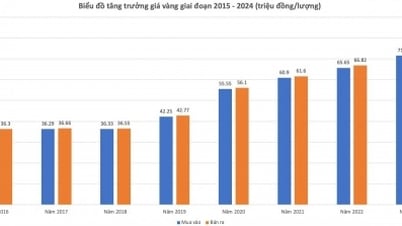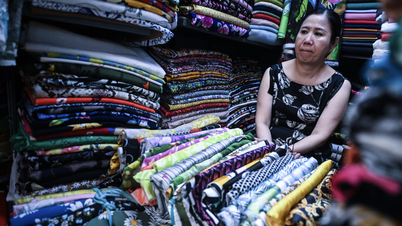 |
| Nord Stream pipeline explosion: UN 'helpless', is it possible that Russia will be compensated for damages? (Source: GT) |
The announcement was made by the United Nations (UN) Deputy Secretary-General for Political and Peacebuilding Affairs Rosemary DiCarlo, who also called on all parties to "exercise restraint" .
Previously, on February 17, Russian Deputy Ambassador to the UN Dmitry Polyanskiy proposed a draft UNSC resolution, requesting UN Secretary-General Antonio Guterres to open an independent and public international investigation into the attacks on the Nord Stream pipeline carrying Russian gas to Europe and identify the responsible parties (perpetrators, sponsors, organizers and accomplices).
On February 22, the Security Council held a closed-door meeting to discuss Russia’s draft resolution. However, so far, Western countries have not agreed on Russia’s proposed document, with many countries opposing the draft resolution prepared by Russia – which calls for an independent international investigation into the Nord Stream pipeline explosions. This means that the resolution is unlikely to be adopted.
| Latest information, according to Reuters, the vote result on March 27 at the UNSC on the draft resolution proposed by Russia received 3 votes in favor from the two permanent members, Russia and China, along with a vote from Brazil, the remaining 12 countries abstained. The draft resolution needs at least 9 votes in favor and no veto from the 5 permanent members, including Russia, the US, China, France, and the UK, to be passed. |
Meanwhile, the Russian side, specifically the head of the Department of Economic Cooperation of the Russian Foreign Ministry Dmitry Birichevsky said in an interview with RIA Novosti news agency that, “Moscow not only intends to insist on a comprehensive and public international investigation with the participation of Russian representatives. It is not excluded that Russia will later raise the issue of compensation for damages caused by sabotage of the gas pipeline project, built by the Russian state-controlled company Gazprom.
Kremlin spokesman Dmitry Peskov said Russia would determine who was behind the explosion before demanding any compensation.
“At the moment, the data indicate that such a large-scale sabotage and a ‘terrorist attack’ on critical infrastructure could not have been carried out without the participation of the state and its special services. Everyone sees that the West is taking all possible measures to cover up this issue… But Russia will do everything possible to clarify the facts,” Peskov said.
Expressing his own opinion, in mid-March, Russian President Vladimir Putin dismissed as "absolute nonsense" allegations that Ukraine could be behind the explosion that paralyzed the Nord Stream gas pipeline, to which the Kremlin boss raised big questions about "who is behind the incident" and the responsibility of the United States.
The Russian leader pointed out that the US had a motive for carrying out the attack on the pipelines in the Baltic Sea, specifically, wanting to block the supply of cheap Russian natural gas to Europe and provide the continent with more expensive liquefied natural gas (LNG).
President Putin also appeared to agree with the shocking conclusion of veteran American journalist Seymour Hersh that, "The US is very likely behind the sabotage of the Nord Stream gas pipeline."
Mr Putin did not say whether Moscow had any evidence to support this view. He also admitted that it would be “very difficult” to bring the whole truth to light. However, the Russian president expressed hope that at some point “the truth and the way things were done will finally be revealed”...
 |
| The Danish Energy Agency has released a photo of a tubular object, about 40 centimeters (16 inches) long and 10 centimeters in diameter, protruding from the seabed next to the Nord Stream 2 pipeline. (Source: Cbsnews) |
The Nord Stream 1 and 2 pipelines, which carry gas from Russia to Germany under the Baltic Sea, were hit by unexplained explosions in September 2022, rendering them inoperable and causing a significant methane leak. Moscow called the incident an act of “international terrorism.”
Pipeline leaks in the Baltic Sea have led to what could be the largest release of climate-damaging methane gas ever recorded, the UN Environment Programme says.
Western countries, including Germany, have said they believe the explosions were a deliberate act but have refused to say who was responsible.
Last September, Sweden and Denmark discovered four leaks in the Nord Stream 1 and Nord Stream 2 pipelines that carry gas from Russia to Germany across the Baltic Sea. Of the four leaks, two were located in Sweden's exclusive economic zone and two were in Denmark's.
Russian, US and EU authorities have all said the leaks could be the result of a targeted attack. The West and Russia have traded accusations, with Sweden, Denmark and Germany launching separate investigations to gather their own information and documents about the incident.
Most recently, late on March 24, the Danish Energy Agency released a photo of a tubular object, approximately 40.64 cm (16 inches) long and 10.16 cm (4 inches) in diameter, protruding from the seabed next to the Nord Stream 2 pipeline, which currently "poses no immediate safety risk." In order to further clarify the nature of the object, the Danish authorities decided to salvage the object with the support of the Ministry of Defense. The agency added that they are still waiting for a response from the pipeline owner before starting the recovery operation.
Moscow has welcomed Denmark's offer to let the Nord Stream pipeline operator witness the investigation into the mysterious object.
At the moment, it is difficult to say about the future of Nord Stream, but according to experts, "damaged pipelines can be restored".
The Nord Stream 1 and Nord Stream 2 pipelines that ruptured have been sealed and frozen, with no immediate plans to repair or reactivate them, Reuters sources said last week.
Nord Stream 1 began operations in November 2011 at a cost of 7.4 billion euros ($8 billion). Construction of the $11 billion Nord Stream 2 was completed in September 2021, but it never became operational after Germany rejected the project days before Russia launched its military operation in Ukraine (February 24, 2022).
Russian energy giant Gazprom holds a majority stake in the giant pipeline project, with the remainder owned by German, Dutch and French companies.
 | Coffee price today March 28, 2023: Robusta continues the uptrend, the upward momentum remains, the possibility of a downward correction appears Robusta coffee was supported after coffee trader Volcafe forecast the global robusta coffee market in the 2023/24 crop year to be ... |
 | Gold price today March 27, 2023: Gold price continues to increase this week, bullish speculation is in the 'driver's seat', determined to reach a peak of over 2,000 USD Gold price today March 27, 2023 started the new week when it increased more than 7% this month and is near a record high... |
 | 11th Sanctions Package: EU Some Are Tired, Others Are Excited, Ukraine Urged to Block the 'Lifeline' of Russia's Economy Russia's law-breaking and loophole-busting behavior is expected to be stopped by the European Union (EU)... |
 | EU finds it difficult to escape Russia, energy power in the old continent still belongs to Moscow despite 'changing stars' Despite the military conflict in Ukraine, Russia's civilian nuclear company Rosatom maintains an important position, ... |
Source


























![[Photo] Nearly 104,000 candidates in Hanoi complete procedures to take the 10th grade entrance exam](https://vphoto.vietnam.vn/thumb/1200x675/vietnam/resource/IMAGE/2025/6/7/7dbf58fd77224eb583ea5c819ebf5a4e)































































![[OCOP REVIEW] Tu Duyen Syrup - The essence of herbs from the mountains and forests of Nhu Thanh](https://vphoto.vietnam.vn/thumb/402x226/vietnam/resource/IMAGE/2025/6/5/58ca32fce4ec44039e444fbfae7e75ec)







Comment (0)